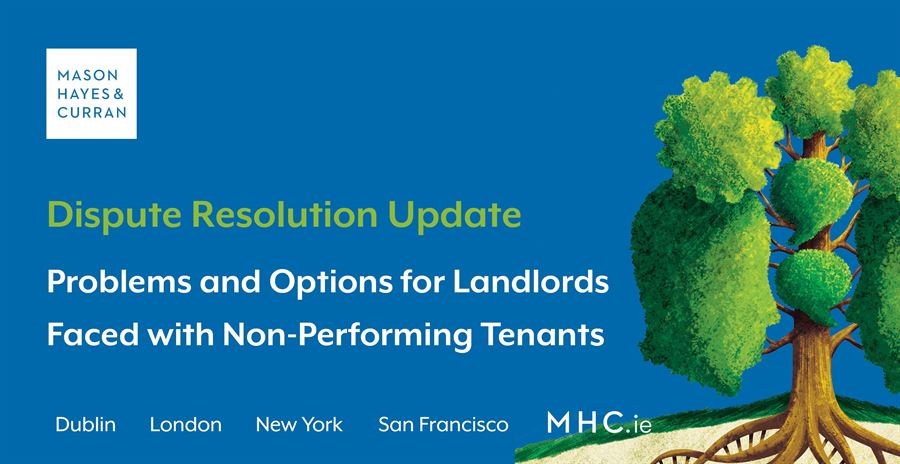
Six months after the Irish Government imposed the closure of non-essential retailers, we are now beginning to witness the fallout for commercial landlords in the sector. In the early stages of the closures, we saw tenants attempting to negotiate deals with landlords. We are now seeing landlords, particularly those in shopping centres, taking legal proceedings against high profile non-performing tenants. We anticipate that this trend will continue. Retail Ireland, a representative body for the Irish retail sector, is calling for government intervention similar to that afforded residential tenants.
Forfeiting a lease as a remedy?
The recent Residential Tenancies and Valuation Act 2020 (the Act) has removed the uncertainty surrounding a landlord’s right to “evict” commercial tenants. We assessed this change here
Depending on the facts and the terms of the lease in question, forfeiting a lease by way of re-entry may be an attractive option for a landlord. A landlord has a right to forfeit a lease where a tenant has breached a covenant or condition of their lease. However, as the forfeiture will terminate the lease, the landlord could be left with a vacant commercial premises that it may have difficulty re-letting in the current market.
The Court route
While the Courts are not currently operating at full capacity, landlords can issue legal proceedings against defaulting tenants. In those proceedings, a landlord could sue for arrears and / or possession. Suing for arrears allows the landlord to pursue the tenant without terminating the lease, thereby keeping the premises occupied. Suing for possession would see the landlord terminating the lease. The landlord may also be able to pursue a guarantor if there is a guarantee in place
Other options
In addition to re-entry and legal proceedings and again depending on the facts, some company law remedies against a tenant could be available and should be considered (if the tenant is a company). These remedies could include petitioning the High Court to have the tenant wound-up following the issue of a statutory demand letter. The statutory demand letter affords the tenant 21 days to discharge the debt. Under a recent change to the legislation, the debt must be €50,000 or greater to avail of this option.
While it is always possible for a landlord and tenant to agree terms other than those in the lease, a landlord may be required to take one of the above steps to focus the mind of the defaulting tenant and encourage meaningful and positive engagement.
Conclusion
We are likely to see continued rental disputes between landlords and tenants for the foreseeable future. Landlords will need to consider the lease in question and the particular facts of the case and tailor the approach accordingly. Landlords will also need to consider not only the immediate non payment of rent but the future ability to re-let any premises.
For more information and expert guidance on successfully navigating similar scenarios, contact a member of our Dispute Resolution or Real Estate teams.
The content of this article is provided for information purposes only and does not constitute legal or other advice.






